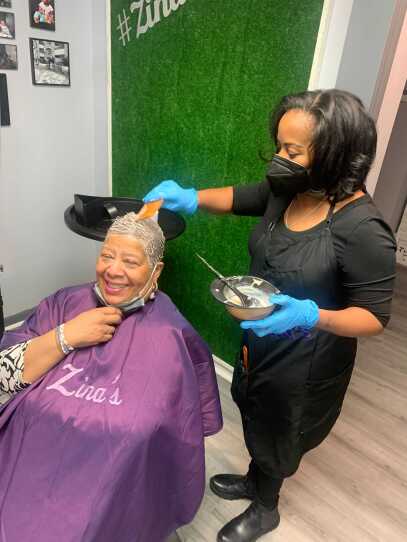The Massachusetts State House recently passed a bill banning discrimination based on natural hairstyle or texture. A day later, the U.S. House passed the CROWN Act, a similar measure.
“For too long, Black girls have been discriminated against and criminalized for the hair that grows on our heads and the way we move through and show up in this world,” said Massachusetts Congresswoman Ayanna Pressley, voicing her support from the House floor.
Both bills still have to pass in their respective senates, but they both speak to familiar experiences for Black women and girls who feel pressured to straighten their naturally curly or kinky hair for work or school. Pressley referred to the case of two twin sisters at a Malden charter school who were ordered to remove their braids because they went against school policy.
Local hairstylists like Zina Thompson, the owner of Zina’s Salon in East Cambridge, are familiar with those struggles. She’s owned the salon for 24 years, and has seen hairstyles change with time.
“We’re doing so many different things with hair now,” Thompson said.
At the federal level, the CROWN Act stands for “Creating a Respectful and Open World for Natural hair.” But in the salon, it takes on a new meaning.
“This is our glow. This is what you see. It’s our presentation — it’s like our crown. It’s your first impression of looking at you. ‘You know, you have beautiful features, but your crown shines,’” Thompson said. “I think we needed something like this, and especially with the younger generation.”
Thompson hopes that the bill will inspire young girls to embrace their natural texture.

“It’s going to show all these little ones: It’s OK to look like this. It’s OK to have braids. Because I think now some of the kids feel as though they have their hair out. They have to have their hair straight. ... And so this is going to show them, no matter which way that you have your hair, it’s accepted everywhere.”
On a recent trip to the salon, I met one of those young girls: Thompson’s great-niece Iris, who was “getting her own crown.”
Her mother April Wynn said that having the bill become law would make it easier for girls like Iris to embrace their natural hair.
“It’s kind of sad that we even have to pass a law in the first place,” Wynn said. “We shouldn’t have to be discriminated against just because our hair looks natural or just because we want to wear our hair a certain way.”
And the message isn’t just for young Black girls. Thompson recalled the teenager Andrew Johnson, who was participating in a high school wrestling match in New Jersey in 2018, when a referee told him to cut his dreadlocks or forfeit the match. The referee was later suspended by the state.
For many Black children and parents, hair is a sense of pride. I remember sitting in my grandmother’s chair, having my hair pressed with a hot comb, holding my ear down so I wouldn’t get burned just to go sit in another chair for hours to get my hair braided. It was a process, to say the least.
Thompson embraces the process. “It just takes time because our hair is different,” she said. “It’s beautifully different."
With the state’s anti-hair discrimination bill and the CROWN Act, we’re one step closer to allowing everyone to style their hair the way they want and leave it that way.








